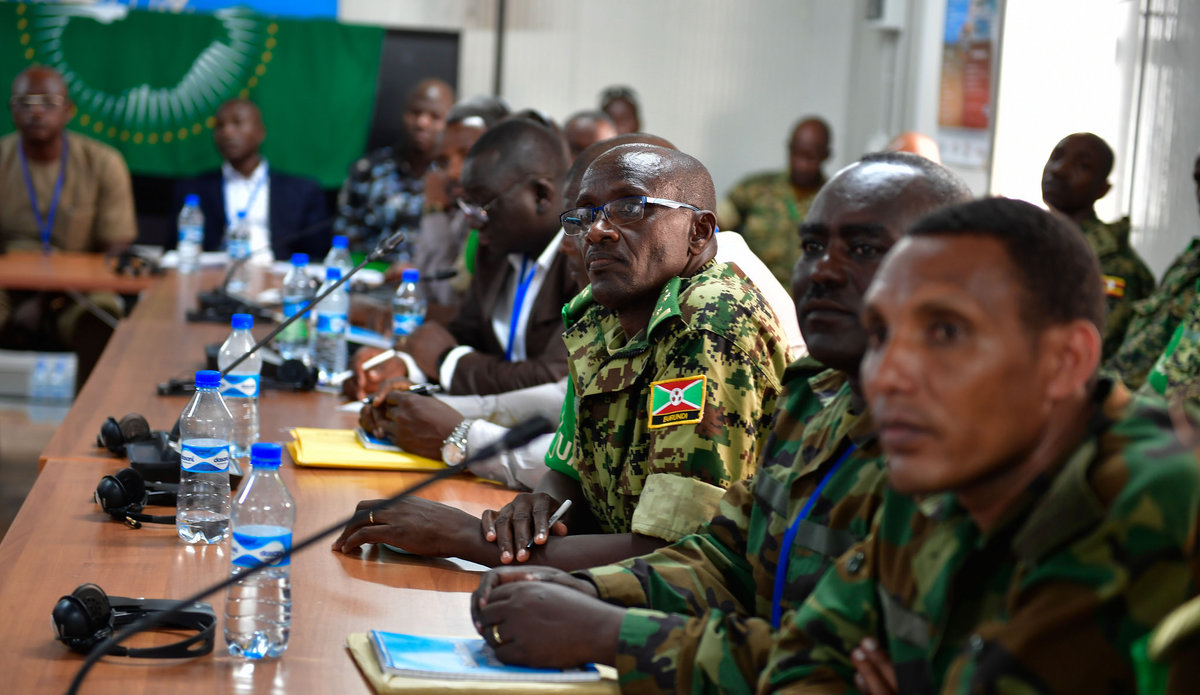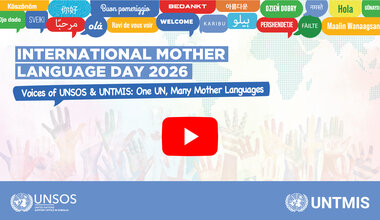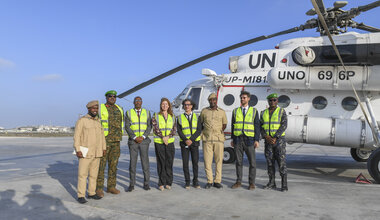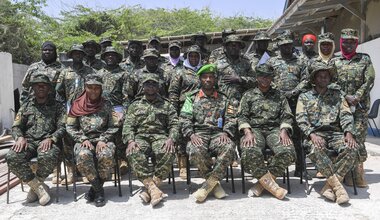AMISOM troop and police contributing countries to be reimbursed for lost equipment during operations
Mogadishu – The United Nations Support Office in Somalia (UNSOS) in coordination with AMISOM and the African Union held a two-day workshop in Mogadishu to review a draft Joint Boards of Inquiry Standard Operating Procedure (SOP) for reimbursement of claims by troop and police contributing countries (TCCs/PCCs) for Contingent Owned Equipment (COE) lost or damaged during operations in Somalia.
The meeting was opened by the Head of UNSOS, Hubert Price, and closed by the Special Representative of the African Union Chairperson (SRCC) for Somalia, Ambassador Francisco Madeira.
Boards of Inquiry (SOP), an analytical and managerial tool used within United Nations Peacekeeping Missions, will be critical in facilitating claims for reimbursement made by countries contributing troops and police officers to the African Union Mission in Somalia (AMISOM).
Speaking during the opening session, Mr. Price said the reimbursement for COE to African Union TCCs/PCCs commenced in 2012 through the United Nations Security Council Resolution 2036 (2012) of 22 February and endorsed in 2016.
He said the workshop was designed to ensure that all TCC/PCC obtain a good understanding of the process to follow in seeking reimbursement and pledged continued UNSOS support to the process.
In his closing remarks yesterday, Ambassador Madeira noted that most Troop Contributing Countries (TCCs) and Police Contributing Countries (PCCs) had lost a substantial amount of equipment because of the hostile and harsh environment in which they operate yet they were unable to seek reimbursement as they did not know the procedures of setting up a Board of Inquiry (BOI).
The SRCC said the process of a tripartite agreement between the United Nations, African Union and troop and police contributing countries on how to seek reimbursement for contingent owned equipment was now complete and awaiting signing by the nations involved.
“With substantial input from Troop Contributing Countries (TCCs) and Police Contributing Countries (PCCs) we can now finalize the process of Standard Operating Procedures and systems to ensure everyone is in agreement with the Standard Operation Procedures and the way in which the Boards of Inquiry will be held,” the SRCC added.
He said the major success of the workshop has been the agreement by UN that equipment lost during war or battle will be compensated. He asked the participants to communicate to share the message with their respective countries and organizations.
“It’s important that the Troop and Police Contributing Countries, United Nations and the African Union are in agreement and comfortable with the way forward and how we operate so that we can expedite the outstanding claims and move forward with the new ones,” the SRCC noted.
Ambassador Madeira asked the countries which were yet to append their signatures on the tripartite agreement to move with speed so that they can be reimbursed for the lost or damaged equipment.
The workshop facilitator, who is also the UNSOS Boards of inquiry focal point and the legal officer for the United Nations Support Office in Somalia (UNSOS), Ms. Zam Zam Nagujja Kasujja, said holding of Boards of inquiry is a mandatory requirement under the Tripartite MOU.
“This tripartite BOI (Boards of Inquiry) arises from a Memorandum of Understanding that the UN reached with Troop Contributing Countries as well as Police Contributing Countries to provide reimbursement for assets for COE (Contingent Owned Equipment) that may be lost or damaged through hostile action or abandonment while in the mission area,” Ms. Kasujja said.
“We all appreciate that AMISOM is not a normal peacekeeping mission and so they have lost a huge quantity of COE. That notwithstanding, we’ve had very few claims from the TCCs. This is because they have not been very conversant with the procedures that the UN uses for submission of claims,” the UNSOS official added.
One of the workshop participants, Col. Kenneth Muheire, from Uganda, said he had acquired enough knowledge and will share with the leadership in Kampala to seek compensation for lost or damaged equipment.
“For the sake of Uganda, we have already signed the tripartite MOU but we have been facing the challenge of reimbursement of the damaged and lost equipment. But with the knowledge acquired here, I think it will be handy and help the leadership back home always submit in time the documents for reimbursement for the claims for the lost or damaged equipment, that’s the Country Owned equipment,” Col. Muheire added.
While Uganda and Ethiopia have signed the tripartite agreement, Kenya and Djibouti have yet to finalize on some issues they had sought clarification. In addition, Burundi which also contributes troops to the mission is yet to sign the document.
Ambassador Madeira later issued certificates to the participants at the end of the workshop.
 UN
UN





